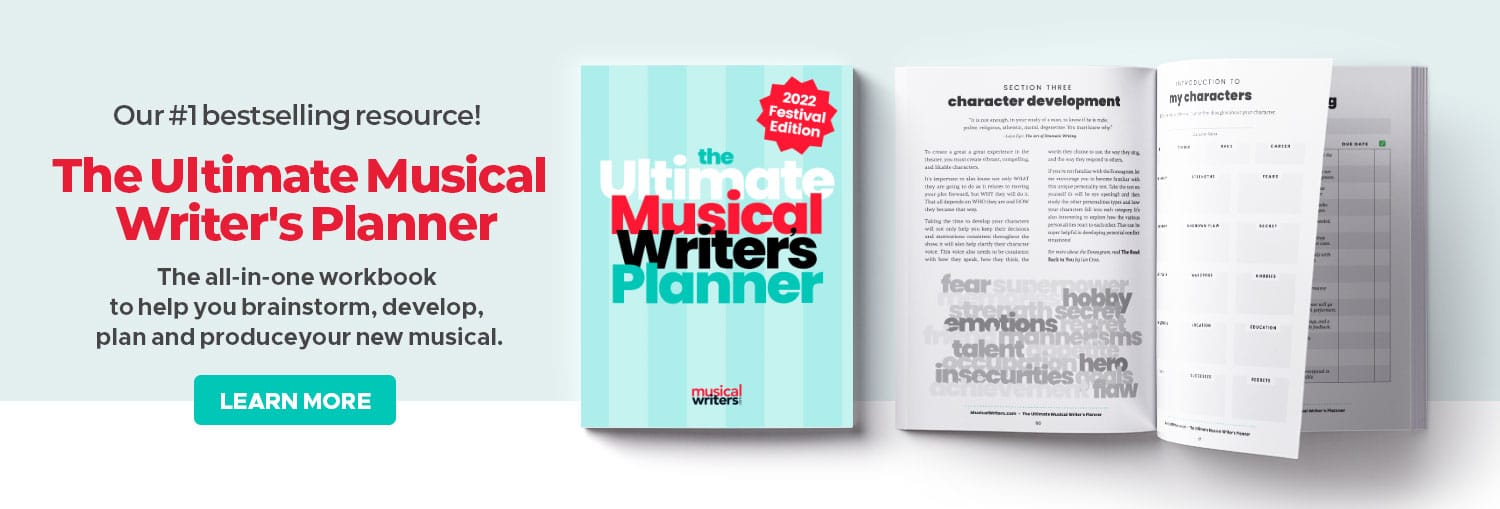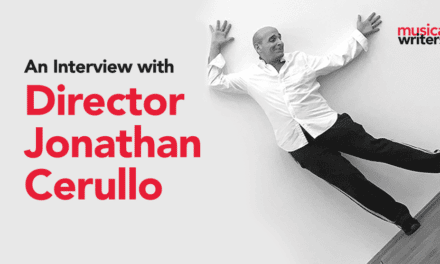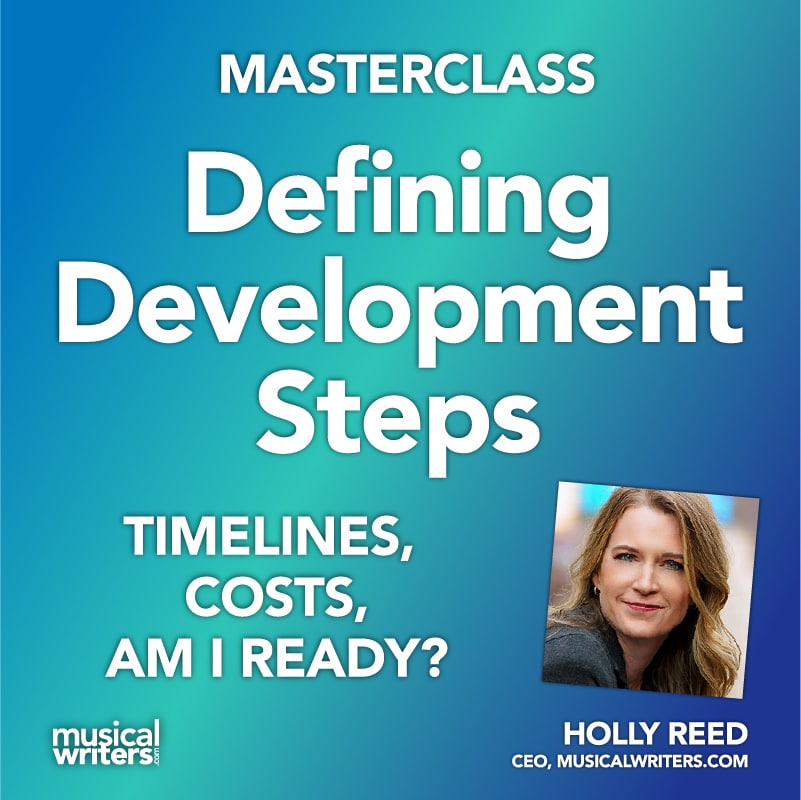Pitching to producers is a skill set that can be developed like any other skill set. The secret is in learning to see your show from the producer’s perspective.
Recently I coached eight writers in Theater Resources Unlimited’s (TRU) Pitching Workshop, as part of the TRU Writer/Producer Speed Date. The event is an intense experience where twelve writers pitch to eleven producers within one hour. Like regular speed dating, you’ve got approximately seven seconds to make a great impression and two minutes to perfect your elevator pitch, engage in a quick conversation with a producer, then move on to the next producer and start the process all over again.
Needless to say, pitching to producers demands focus. Both parties are hoping for “instant attraction,” and sometimes that does happen. Options have resulted from our Speed Dates. But more importantly, writers get better and better at pitching their projects to producers and learning to discern what producers are looking for, what is most interesting about their own work and how to sell their ideas.
Pitching to Producers: Your Elevator Pitch
When pitching to producers, having an elevator pitch provides a quick introduction to your show geared toward creating interest in the listener. It is more of a marketing skill than anything else, and like any skill it can be learned and gets better with practice.
An elevator pitch takes approximately two minutes. That’s it. You’ve got a mere two minutes to make the producer lean in, smile and ask for more information.
Many of my writers, in this recent workshop and in others I’ve coached over the years, spend too much time on their synopsis. Others undersell themselves, leaving major awards from their other work left unspoken, or merely get so flustered under the pressure to persuade someone whom they perceive has the power to make or break their show that they repeat themselves or stumble over their words.
Relax, friends. You’ve got this. It’s all in the preparation ahead of time.
Just as an actor has to always be ready with a couple of great monologues to perform in an instant to showcase his talent, you as a writer should always be ready with a prepared elevator pitch “just in case” you are introduced to someone with the potential to move your show forward.
It’s a conversation
Always remember that pitching to producers is the beginning of a conversation, so make your style conversational. Some writers are such good wordsmiths that they try to memorize their pitch word for word and recite it as a speech, or worse, have the pitch written down and then read it verbatim. They then sound “market-y” and artificial, which is definitely not in their best interest!
I recommend that you write your pitch on index cards using bullet points in the beginning. This keeps my writers on track and focused, yet still maintaining that all-essential eye contact and smile during the conversation.
The Pitch Template
A good organization strategy for creating a pitch for producers should follow this template, written by TRU founders Bob Ost and Gary Hughes and used in our workshops and in my own personal coaching.
1. The Attention Grabber
The first thing necessary is to grab the producer’s interest in those first seven seconds. You want to give them a reason to remember you and to engage with you in a conversation.
Sometimes this is most effective by asking a question:
- “What do you do when …”
- “What happens when …”
- “Did you ever have an experience where …”
Sometimes you can make a statement to move your listener and get them on the same emotional wavelength:
- “Imagine yourself …”
- “How would it feel if …”
- “What would you do if you were faced with …”
Some writers make a statement that is surprising in some way, or use a quote, a song title, or anything the listener can readily identify with that describes the content of their show. Especially helpful is when you can help the producer make comparisons with something they’re already familiar with, for example, “This show is Once meets Torch Song Trilogy…”
The important thing to remember is that at the beginning you must engage your listener and start a conversation, not talk at them. This is a brief (very brief!) introduction to you and your work, useful for marketing your show to someone. Your goal is to get them to smile, lean in, and want to hear more.
2. A Brief Synopsis
As a writer you’ve spent months, perhaps years, writing and rewriting your plot to get the structure right. It’s natural that you would want to share the entire story with someone, since it’s so doggone interesting and engaging.
It probably is, but this is a two minute pitch so time is of the essence. You want to choose your words carefully and leave out anything that doesn’t absolutely need to be said.
Often a concept synopsis is more helpful than a true plot synopsis. A producer wants to hear the essence of your show, not a play-by-play retelling of each detail in every act! And don’t tell them what they’ll feel in the show; instead, evoke the feeling itself through the careful choice of your words in the pitch.
What can be included in this brief synopsis?
- The 5 W’s (who, what, where, when and why)
- The 6th W (want), which is the main characters’ wants and why they can’t get it (the obstacle)
- The major conflict
- The universal theme
- What the audience will see when the curtain goes up (the world)
- An overview of the dramatic arc of the show, or the emotional high point (climax)
- Don’t forget to tell the genre of the show and the sound of the music (if it’s a musical), or if it’s a dance-heavy production, the style of dance.
Remember, less is always more and time is crucial here. You don’t have to address each of the above bullet points, but know which ones are most pertinent to communicate the idea of your show. Know your basic dramaturgy and be prepared to answer the above questions if they come up.
Also, you may not be the best editor of your own synopsis. Try it out on a few friends and listen to what they find engaging or unnecessary.
Both steps 1 and 2 should take approximately one minute or so of your time, in order for you to really sell your show during the last minute.
3. Benefits
Don’t tell ‘em, sell ‘em! Show why your show has significant advantages and why they should produce it:
- Timely and relevant – this show must be produced now! There is a recognized audience for this material
- Premise – illustrate how your premise is unique or special in some way that will make it stand out
- The show is based on a pre-existing property or well-known source material, which has recognized branding
- Stars associated with the project (directors, actors, composers, etc.)
- Previous production history (share photos, reviews, audience quotes)
- Give other benefits that producers find attractive:
- Cast size (if it’s on the small end – otherwise don’t mention it)
- Unit set, minimal set requirements
- Developmental steps or awards
- If there’s money behind your project, please mention it during the pitch (no need to be specific yet)
- Always give your brief bio, especially if you’ve won awards or have other work that’s been produced.
Sometimes it’s helpful when pitching to producers to remember the acronym SAFE (Stars, Audience, Financials, Environment) as a way to think of possible benefits your show may have.
4. Concept Recap
At this point you are almost out of time (I hope you’re still relaxed, smiling, and not out of breath! ) and you need to summarize your pitch.
Briefly recap your original concept with only one or two sentences. Remember, you’ve got a really great show here that you’re presenting to someone!
Ending Your Pitch
After your two minutes are up, thank the person for listening and offer to follow up with them by sending them an invitation to a reading, sending them the script or music files, forwarding them to your website, or leaving behind a packet of information for them to read later.
Then BE QUIET and LISTEN.
Have a Conversation
You’ve pitched your show to the producer, and now it’s their turn to ask you questions. Hopefully there are a few, as that shows your pitch has successfully engaged his/her attention and interest.
Answer any questions they present honestly, and again offer to follow up with more information and then do so. Speak with passion and confidence, and always leave them wanting to hear more.
Your job is to create both a favorable impression about yourself and your work to a new contact that may be interested in your show. Get them to want to read your script, to come to a reading, to advise, to recommend to a friend – or even to produce or invest in the show personally. It happens all the time.
Don’t be caught off-guard. Be ready with your practiced pitch.
Need some help with YOUR pitch? Contact us here.




















very helpful. I’m getting busy now.
I sure wish someone, anyone would take this hilariously trashy 70’s film “Empire of the Ants” and make a low-budget musical out of it.
It has everything! Joan Collins’ character, couples who hate each other but have a story to confess. Giant ants.
I know everyone has seen this. They don’t admit it.